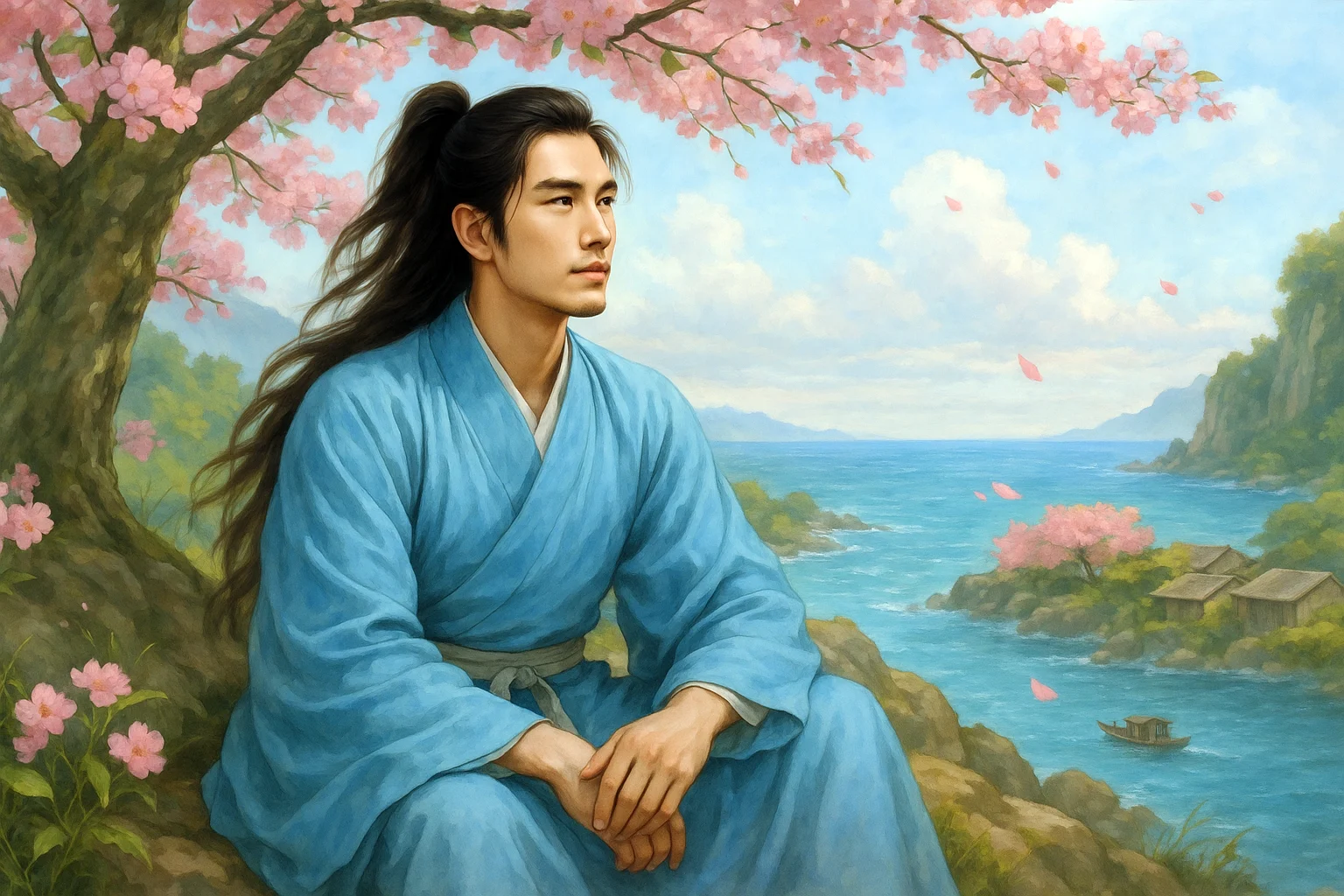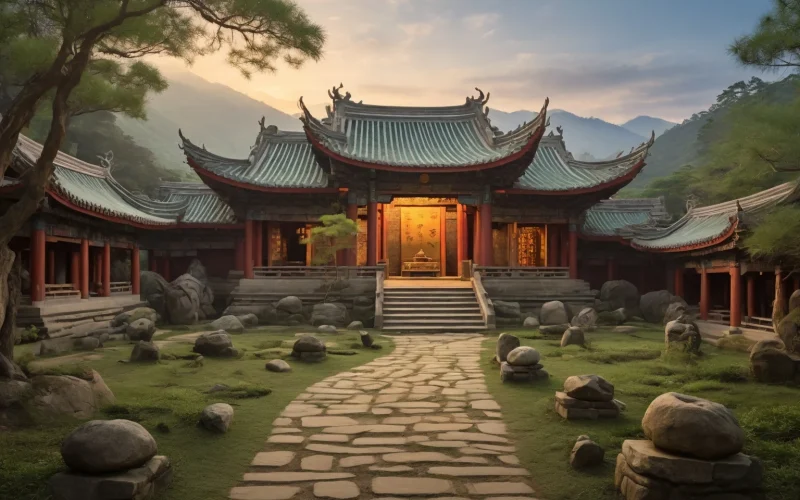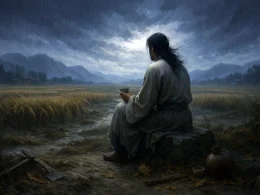On the hilltop, a monk’s robe hangs in the cell,
Outside the window, stream birds fly—none to tell.
Dusk descends halfway down the mountain road,
When temple bells chime through emerald abode.
Original Poem
「过融上人兰若」
綦毋潜
山头禅室挂僧衣,窗外无人溪鸟飞。
黄昏半在下山路,却听钟声连翠微。
Interpretation
This seven-character quatrain, composed during Qiwu Qian’s journey to visit his friend, the monk Rong Shangren, captures the quiet beauty of a mountain monastery and the poet’s meditative state of mind. Though the intended meeting does not occur, the poet finds solace in the serene surroundings, crafting a scene where absence becomes presence, and silence speaks louder than words.
First Couplet:"山头禅室挂僧衣,窗外无人溪鸟飞。"
Shān tóu chán shì guà sēng yī, chuāng wài wú rén xī niǎo fēi.
A monk’s robe hangs outside the mountain-top retreat—
through the window, no one—only streamside birds in flight.
The opening lines establish a sense of quiet solitude. The "monk’s robe" (僧衣) hanging outside the meditation hall suggests Rong Shangren’s recent presence, yet his absence is palpable. The empty window frame and the birds in flight (溪鸟飞) create a contrast between stillness and movement, emphasizing the tranquility of the setting. The poet’s gaze lingers on these details, turning an unmet expectation into an opportunity for contemplation.
Second Couplet:"黄昏半在下山路,却听钟声连翠微。"
Huáng hūn bàn zài xià shān lù, què tīng zhōng shēng lián cuì wēi.
At dusk, halfway down the mountain path—
suddenly, temple bells resonate through emerald mist.
The second couplet shifts to the poet’s descent. "Halfway down the mountain path" (半在下山路) implies a reluctant departure, as if the poet has tarried, unwilling to leave the peaceful atmosphere. The unexpected sound of temple bells (钟声) piercing the "emerald mist" (翠微) transforms the scene—the auditory intrusion deepens the sense of serenity rather than disrupting it. The bells, a symbol of Buddhist practice and the passage of time, bridge the human and natural worlds, their echoes lingering in the twilight.
Holistic Appreciation
This poem captures a quiet moment when the poet visits a friend but finds him absent. Through depictions of a mountain temple, streamside birds, dusk, and temple bells, it paints a serene and secluded scene of a Buddhist monastery in the deep mountains, reflecting the poet's own tranquil and carefree state of mind.
Though the scenery is sparse, the interplay of movement and stillness, distance and proximity, sound and silence weaves together into an elegant and distant twilight landscape of the mountains. The first couplet moves from objects to scenery, using the monk's robe and flying birds to subtly convey the poet's peaceful and contented mood. The second couplet shifts from scenery to emotion, where the evening bell and emerald mist are not just realistic depictions but also symbolic of the poet's spiritual harmony with nature.
The poem exemplifies the simple yet refined beauty of Qi Wuqian's landscape poetry—minimal brushstrokes that leave endless aftertastes.
Artistic Merits
- Simplicity as Strength
With just four lines and twenty-eight characters, every word counts. A few carefully chosen scenes unfold a vast artistic conception. - Dynamic Interplay of Movement and Stillness
The flying birds and echoing bell contrast with the quiet meditation room and twilight mist, enhancing each other's beauty. - Fusion of Sound and Sight
The final line merges auditory and visual senses, using the word "mingle" to connect the bell's toll with the emerald hues, creating an ethereal realm. - Convergence of Scene and Sentiment
The disappointment of missing a friend transforms into appreciation for the mountain's quiet beauty, shifting from regret to serene acceptance.
Insights
This poem reminds us that many of life's "unfulfilled wishes" can become opportunities for unexpected beauty. Because the poet fails to meet his friend, he instead savors the tranquility of the mountains and the ethereal resonance of the evening bell—a wisdom of adaptability and perspective.
At its core, the poem embodies the spirit of landscape poetry: in the beauty of nature, we can let go of attachments and find peace and transcendence of mind.
About the Poet

Qiwu Qian (綦毋潜 692–c. 755), a native of Ganzhou (modern-day Ganzhou, Jiangxi), was a representative poet of the Landscape and Pastoral School during the High Tang period. He earned the jinshi degree in 726 (the 14th year of the Kaiyuan era) and held official positions such as Right Reminder (You Shiyi) and Editorial Director (Zhuzuo Lang) before retiring to the Jiangnan region. His poetry, renowned for its depictions of reclusive life and natural landscapes, is characterized by a serene and understated style. He exchanged poetic works with Wang Wei, Meng Haoran, and other literary figures. The Complete Tang Poems (Quan Tangshi) preserves 26 of his poems, which stand out distinctly within the High Tang landscape poetry tradition and significantly influenced the development of later Zen-inspired poetry.












